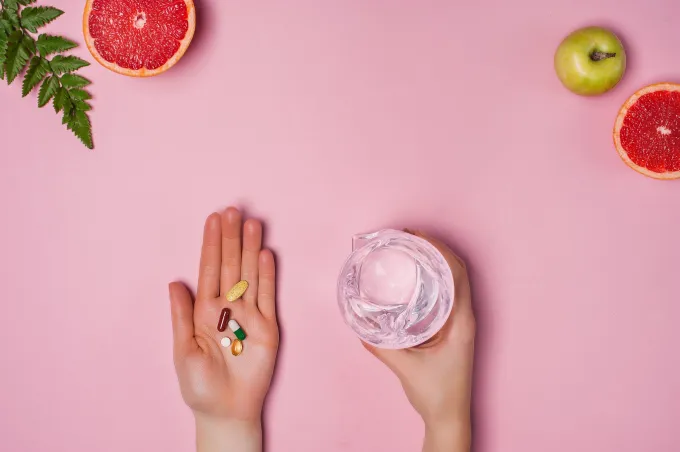|
By Melissa Blake, ND
Our bodies have an amazing natural ability of keeping to a daily schedule via an internal 24-hour master clock.1 This clock contributes to the patterns, also known as circadian rhythms, of many biological activities including sleep-wake cycles, eating patterns, and hormone function.1 Finding ways to support and balance this clock, along with the many systems it regulates, may offer a novel way to optimize health. One way to optimize is through diet timing. The circadian diet as a way of eating takes into account not only what we eat, but when.2 It is an approach to eating that synchronizes food intake around our biological clocks, emphasizing eating in sync with the body’s natural tendencies and instincts. This means eating during daylight hours or hours when we are naturally more active. Eating in this way can help support circadian rhythms and contribute to overall health and wellness.2 As diets and terms including intermittent fasting, circadian diet, and time-restricted eating gain popularity, the question may arise as to whether the principle on which this “circadian approach” applies to other aspects of nutrition, including supplementation. 5 common supplements Although there’s still much to learn about optimal timing for both food and supplements, current evidence suggests it may play a role.3 Here are a few general guidelines for five common supplements to help you add the extra layer of timing and optimize your plan: B complex B vitamins are often recommended to support healthy energy and mood.4 There is some evidence that taking B vitamins before bed can have a negative effect on sleep quality.5 Consider taking any B vitamins, including a B complex, earlier in the day with food. Fish oil The most common complaints I hear about fish oil are burping or nausea. Taking fish oil supplements with food, divided into two doses, may help reduce these harmless yet annoying side effects. Magnesium Magnesium is an essential micronutrient that plays a role in hundreds of reactions in the body.6 Due to the overall benefits of magnesium supplementation, consistency is more important than any timing in this case. Known for muscle relaxation and improved sleep, taking magnesium before bed may enhance those benefits in some people.7 Others may notice digestive issues and may choose to take with food. Probiotics Any recommendation related to probiotic supplementation should be based on the specific strain; however, much of this detailed evidence does not yet exist. Meal timing has more or less of an impact on probiotics depending on the strain, the dose, delivery method, etc.8 The consensus, however, is to take probiotics 30 minutes before or during a meal versus after eating.9 Another guideline is to space probiotics away from antibiotic medications by two hours to reduce interaction. Vitamin D Along with vitamins A, E, and K, vitamin D is a fat-soluble vitamin that is better absorbed when taken with a fat-containing meal (ex. fatty fish, avocado, olive oil, cheese, eggs).10 Although we do not have substantial evidence to support specific timing, it may make sense to take vitamin D supplements in the morning with breakfast to mimic the timing of exposure to natural sunlight. Summary As we continue to learn about specific supplements and optimal timing, consider that the best timing is the one you can stick with. You cannot benefit from a supplement you do not take. The most important thing is to take your supplements at a time that is convenient for you so you can be consistent. Work with a knowledgeable healthcare provider to determine the optimal plan for you that includes quality, quantity, and timing. References:
0 Comments
We all want healthy, glowing skin, right? But no matter how many creams, serums, or treatments emerge, the fact remains that healthy, luminous skin comes from within! Here are eight ways to glow from the inside out. Collagen Collagen supports skin repair and can be obtained through the consumption of meat or in supplement form. Supplementation with high-quality collagen has been shown to increase dermal collagen density, skin elasticity, and hydration.1 Diet A healthy diet is related to fewer lines and wrinkles.2,3 Additional studies have also linked healthcentric diets to fewer changes in pigment and reduced skin dryness and atrophy.4,5 Eat the rainbow by filling your plate with a full spectrum of different colored fruits, veggies, whole grains, and lean protein. Exercise Exercise is good for more than your physique. Endurance exercise has been shown to positively impact the aging process. During exercise the body produces an exercise-stimulated compound called IL-15, which plays a significant role in repairing skin tissue.6 Hydrate Adequate hydration helps support glowing skin from the inside out; according to a recent study, increased dietary water intake positively impacts skin physiology.7 Omega-3s Supplementation with omega-3s has been shown to help reduce acne.8 Recent studies suggest that omega-3s, particularly EPA, may support skin health and photoaging due to UV radiation.9 Probiotics Gut health has been shown to impact the health of your skin. Probiotics have been shown to help control P. acnes bacteria and reduce sebum production. Excess sebum encourages the colonization of P. acnes, which leads to acne.10,11 Sleep One night of missed sleep can leave you bleary-eyed and reaching for your coffee cup, but did you know that consistently poor sleep can lead to increased signs of aging, reduced barrier function of skin, and dissatisfaction with appearance?12 Prioritize sleep to care for your overall health and skin.12 Vitamin C Healthy skin needs lots of vitamin C, which helps stimulate collagen production.13 Vitamin C is also a powerful antioxidant that helps to protect against photodamage from UV rays.13 Your skin protects you, so return the favor by making small changes to protect your skin from the inside out. Whether it’s establishing healthy sleep hygiene, working on your gut health, or just making sure you’re getting enough vitamins and minerals. Your skin will thank you. References:
Urological health is vital to every man’s well being. Learn what urologists do and when to see one.When was the last time you scheduled an appointment with a urologist?
Urology is the branch of medicine that focuses on the health of the urinary-tract system, in addition to male reproductive health. While consulting a doctor who specializes in these areas may make you uneasy or uncomfortable, it shouldn’t. You see, urological health is vital to your well being. And your urologist is meant to be a healthcare partner who looks out for your best interests in those areas of your body. What do urologists examine? Urologists are trained to examine, manage, and treat the urinary tract and male reproductive system. As the name indicates, the urinary system, (also known as the renal system or urinary tract) eliminates urine, controls electrolytes, and regulates blood pressure and blood pH. It consists of the following organs:1
Urologists treat symptoms involving these organs as well as those involving the male reproductive system: the penis, prostate, and testicles. The areas they often focus on include:2
These are just a few of the more common reasons patients may be seen by urologists. Why see a urologist? Urologists may be able to recommend preventative measures to encourage good urological health, uncover (or resolve) male reproductive issues, and treat urinary infections or illnesses.4 Whether you’re facing a minor issue or a chronic health problem, you’ll want to know exactly what’s going on in that area of your body—and a urologist can help keep you healthy. While some people might associate urology with pain, this is more of a stereotype than a reality. During most invasive procedures, men can expect an anesthetic to numb the affected area. Admittedly, patients might feel pressure or movement from time to time, but they shouldn’t experience pain or significant discomfort. Early detection for any illness is crucial, so don’t let your worries take over common sense. Men in their 40s and 50s—if they aren’t already doing so—should start seeing their urologist regularly to stay on top of their urological health. This content is not intended as a substitute for professional medical advice, diagnosis, or treatment. Individuals should always consult with their healthcare professional for advice on medical issues. References:
Submitted by the Metagenics Marketing Team Interview with Lyra Heller, MA Our bodies change as we age—as hard as we might fight it. For women who want to maintain a sexually active life with a partner, that may mean accommodating some physical changes. We talked to Lyra Heller, MA to learn her advice on what we can do in order to keep that libido alive. How does menopause affect sex? This is a complex question because women’s sexuality is complex. Part of your experience around sexuality and your sexual response is governed by changing hormones. The major impact centers on what menopause means to you, what it symbolizes, your relationship with your partner, and your general health and sense of wellbeing. How do changing hormones affect sex? Menopause is a process. It’s a major life transition marked by declines in sex hormones that signal the end of your reproductive years. Perimenopause is the first phase. It can begin sometime in your 40s and may extend into your mid-50s. The symptoms are related to fluctuating hormone levels that cause changes in menstrual cycle quality and frequency, hot flashes, spontaneous sweats leading to poor sleep quality, anxiety, and moodiness. You may notice some weight gain. Desire to engage in sex can be the last thing on your mind because you are tired, uncomfortable, possibly self-conscious. As estrogen levels continue to decline, vaginal dryness, which loosely translates as you don’t lubricate as well when you’re sexually aroused, may become an issue. This can result in painful intercourse, and it can produce a sense of negativity as you approach sex, because it hurts. Part of the menopausal experience is the vaginal lining tends to thin, and sometimes the walls of your vagina can narrow, so intercourse in general can be hurtful. How do your feelings and thoughts about menopausal changes affect sex? Christiane Northrup, author of Women’s Bodies, Women’s Wisdom: Creating Physical and Emotional Health and Healing says, “Thoughts are an important part of your inner wisdom, and they are very powerful. A thought held long enough and repeated often enough becomes a belief. A belief then becomes your biology. ”1 Menopause is a time of physical transformation that encompasses the aging process. Desiring an active sex life at times requires engaging in difficult and rewarding conversations with yourself and your partner because your body may not perform as before. Sounds simple enough, but it can be challenging to communicate “what turns you on.” Yet this may become a core issue. Other considerations that dampen sexual desire are:
Aging seems to come with increased aches and pains, whether from arthritis or just general physical deterioration. How can pain affect a healthy sex life? Pain hurts a healthy sex life! You don’t want to have sex when you hurt. So what happens is, you decide to control the pain. And there are pain medications that will actually reduce your desire to have sex. In fact, a lot of medications can cause sexual problems. Plus, drug combinations and mixtures of prescription with over-the-counter (OTC) medications are all capable of inducing disinterest in sex. This is where lifestyle becomes really important. If you’re suffering from a chronic health condition, the trajectory of seeking relief should start with a self-focused approach in partnership with your healthcare practitioner. Some of the major issues requiring medications that might affect your sex life can be elevated blood pressure, depression, anxiety, gut problems, and others2—these are all things that can in some instances also be helped by diet and lifestyle and becoming more physically active. With minor health concerns, a healthcare practitioner can provide guidance on what lifestyle modifications may help. Think in terms of being more proactive in how you approach your food choices, how you want to deal with the excess burden of weight, how you want to deal with blood pressure, adrenal function, and elevated blood fats—these are all capable of being modified by a healthy lifestyle. If you have had a heart attack or have coronary artery disease, do you need to be concerned with continuing normal sexual activities? Typically there is no concern as long as there is doctor oversight. If you experience shortness of breath, can’t walk very far, have poorly controlled blood pressure, those kinds of things are going to affect sexual vitality. That said, cardiovascular disease is the leading cause of death for women.3 It is important to appreciate your heart disease risk may go unrecognized even though knowledge about gender differences grows.4 New research suggests that women experiencing hot flashes before age 42 may have an elevated risk of cardiovascular disease when compared to women with late onset vasomotor symptoms (older than 42).5So heart disease is not restricted to women over 65. A baby aspirin a day may not be enough protection.6 Take your heart health seriously. If you are under the age of 65, and especially if you have a family history of heart disease, pay close attention to heart disease risk factors. The risk factors for heart disease are the same as for premature estrogen decline associated with early perimenopause: smoking, physical inactivity, overweight, standard American diet.7 Be proactive. Talk with your doctor. Are there any options out there that can help with libido?Experiencing perimenopause and libido is different from experiencing postmenopause and libido. Perimenopause is a rollercoaster ride of fluctuating hormones. Hot flashes and night sweats reduce your sleep. With the exception of some women whose sex drive may increase during perimenopause, you’re tired or irritable or anxious. If you’re depressed, it may worsen. You may feel old and ugly. As the extreme symptoms subside, if your libido is still hovering around zero, see a doctor to discuss possible interventions. There are several noteworthy methods: vaginal lubricants, moisturizers, and topical hormones. Water-based vaginal lubricants have a short-term effect on dryness. Vaginal moisturizers differ in that they have a longer-term effect and are prescribed on a regular basis—daily or every 2–3 days, depending on the extent of the dryness. Hyaluronic acid vaginal gel may improve symptoms of vaginal dryness, comparable with the effect of topical estrogen therapy. Both are recommended to reduce friction contributing to painful intercourse. Low-dose vaginal topical estriol, a weak estrogen, is an effective way to kindle sexual desire in some women and reduce vaginal dryness. The effect is different from oral hormone replacement therapy (HRT). Topical estriol seems to exert local as opposed to systemic effects. There are other topical hormones available that your doctor can prescribe, as well. If want to be sexually active throughout life, you can. It is a choice—a healthy, rewarding choice. Libido can be nourished. Discovering your capacity for creativity, curiosity, and experimentation is critical to being “turned on.” Grappling with the physical changes of menopause stimulates the need to explore your beliefs and feelings about what is means to be sexually intimate as we age. This can involve venturing into uncharted waters on the adventure of a lifetime. This content is not intended as a substitute for professional medical advice, diagnosis, or treatment. Individuals should always consult with their healthcare professional for advice on medical issues. REFERENCES:
|
Categories
All
Archives
April 2024
|
|
Join Our Community
|
|
Amipro Disclaimer:
Certain persons, considered experts, may disagree with one or more of the foregoing statements, but the same are deemed, nevertheless, to be based on sound and reliable authority. No such statements shall be construed as a claim or representation as to Metagenics products, that they are offered for the diagnosis, cure, mitigation, treatment or prevention of any disease. |






 RSS Feed
RSS Feed